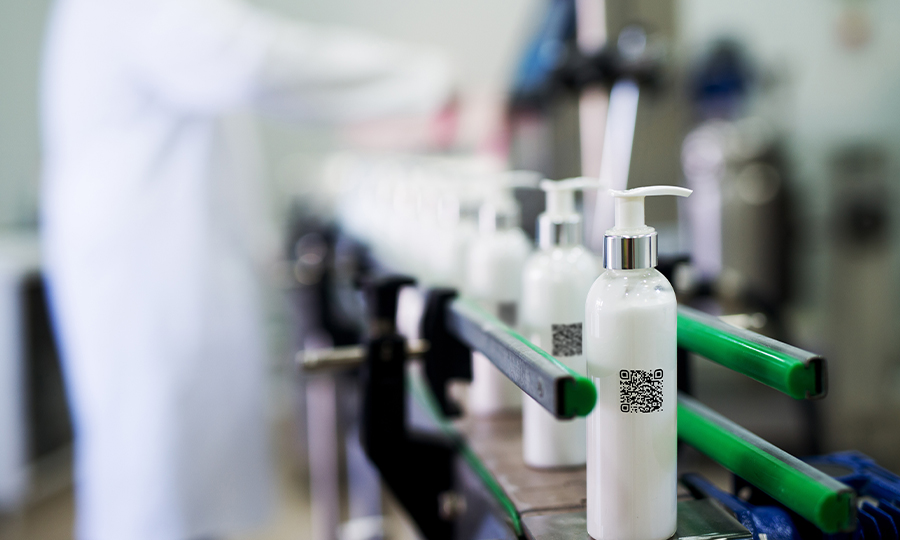SUSTAINABILITY IN COSMETICS: TRACEABILITY UNVEILS THE NEW FRONTIER

The integrated ecosystem of solutions, DIAMIND, developed by Antares Vision Group for the cosmetic industry, is in line with the global objective of reducing the environmental and human impact of cosmetic products
The beauty industry faces growing consumer demands to exhibit transparency and sustainability within their supply chains.
Supply chain sustainability in cosmetics addresses the environmental and human impact of products, from sourcing and producing raw materials to manufacturing, packaging, distribution to the final customer, and post-consumer activities.
The growing sensitivity on the part of consumers and the need to reduce the environmental impact of human activities to preserve the planet have guided government regulations and policies, as well as social movements worldwide.
Sustainability in cosmetics is becoming mandatory
The U.S. Food and Drug Administration (FDA) “is required under the National Environmental Policy Act of 1969 (NEPA) to evaluate all major agency actions to determine if they will have a significant impact on the human environment.” Federal agencies implement NEPA and evaluate the possibility of environmental impacts by conducting categorical exclusions, environmental assessments, and environmental impact statements.
The European Commission “aims to ensure coherence between industrial, environmental, climate and energy policy to create an optimal business environment for sustainable growth, job creation and innovation.”
Increasingly, there are calls for cosmetic supply chain sustainability standards to be made mandatory. The European Parliament in March 2022 passed a resolution to tackle environmental and human rights in EU supply chains. This new Supply Chain Act will require organizations to integrate sustainability into corporate governance and management systems, and frame business decisions in terms of human rights, climate, and environmental impact.
Last March 2023, the European Commission developed a set of proposals to transform sustainable products from the exception to the norm. This proposal includes many aspects of sustainability, such as eco-design of products, durability, reusability, repair, recycling, and traceability, creating a new path to sustainability.
This drive toward cosmetics supply chain sustainability comes from consumers: an opportunity for the beauty industry
It’s a relevant opportunity for brands and manufacturers to guarantee the origin of raw materials and the authenticity and quality of products. It is also an unprecedented opportunity to provide distributors, retailers, consumers, and other stakeholders with product traceability information at every supply chain step.
The United States is yet to follow suit, but consumer groups are letting the government know they want tighter standards for the raw materials used in cosmetics.
Much of the drive toward sustainability comes from consumers who want to know that ingredients are pure (or at the very least safe) and have been ethically sourced. For example, 62 percent of Generation Z consumers (born in the late 1990s) prefer to buy from sustainable brands, and 73 percent will pay more for sustainable products.
There is mounting pressure for stricter regulations in the United States, where the Food and Drug Administration (FDA) is being used in cosmetics. For example, environmental and consumer advocate groups such as the Environmental Working Group (EWG) believe more chemicals should banned, like in the EU, where 1,300+ substances are prohibited from being used in cosmetics.
Clean Beauty, the movement that advocates for safe, clean ingredients and transparency in product labeling, is also concerned with the ethical sourcing of ingredients. Consumers want reassurance that their cosmetics are not linked to deforestation, pollution, and animal or child cruelty. The primary problem is that many cosmetic products use a few “core” ingredients, many of which pose unique challenges for achieving sustainability in the cosmetics supply chain. They are difficult to obtain sustainably and ethically, and child labor, poor working conditions, and illegal mining are common.
Cosmetic supply chain sustainability is not a pipe dream
Technology and solutions exist to help companies evaluate their operations, identify strengths, weaknesses, and pain points, and take corrective action. These include:
- supply chain digitalisation,
- cloud-based data systems,
- and real-time monitoring.
For instance, a 2021 report by Gartner said that digitalisation is a key enabler of agility because it supports a more transparent, automated, intelligent, and orchestrated end-to-end supply chain.
The integrated ecosystem of solutions, DIAMIND, developed by Antares Vision Group for the cosmetic sector, works at different levels:
- Line (inspection for quality control of products and raw materials and traceability);
- Factory (transformation processes efficiency and sustainability);
- Warehouse (monitoring serialized products in logistics and distributions);
- Enterprise (providing transparency within the company);
- Supply chain (offering end-to-end visibility.
AV Group’s technologies promote digitalisation and sustainability by helping companies to reduce the environmental impact associated with the product’s life cycle, improve process efficiency, develop new sustainable products, and monitor the effects of changes. The Group empowers companies to monitor the LCA (Life Cycle Assessment) of products to assess the environmental footprint throughout their entire life cycle (e.g., energy consumption, raw materials used, atmospheric emissions, waste generated, water consumption, transport, end-of-life).
Product life cycle assessment ultimately enables companies to enhance their environmental performance, enhance a positive brand reputation, and represent a distinctive advantage to attract consumers and investors. Let’s experience end-to-end sustainability, combining product and packaging, processes, and supply chains!